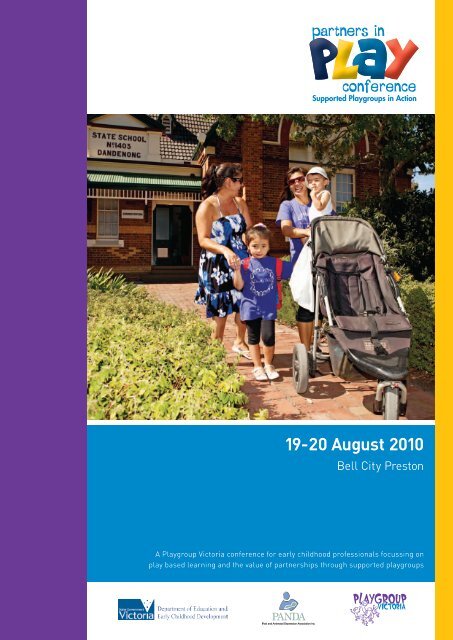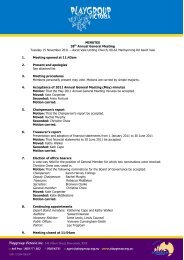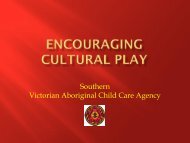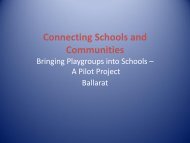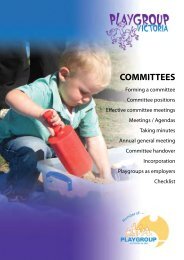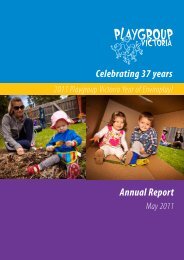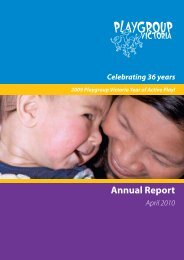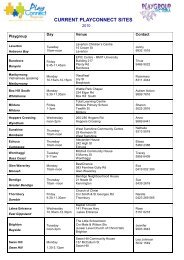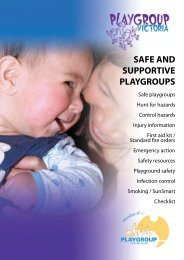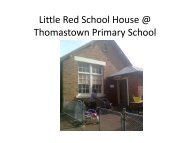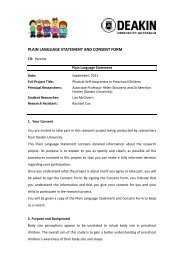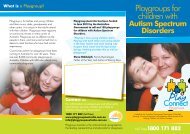19-20 August 2010 - Playgroup Victoria
19-20 August 2010 - Playgroup Victoria
19-20 August 2010 - Playgroup Victoria
You also want an ePaper? Increase the reach of your titles
YUMPU automatically turns print PDFs into web optimized ePapers that Google loves.
<strong>19</strong>-<strong>20</strong> <strong>August</strong> <strong>20</strong>10<br />
Bell City Preston<br />
A <strong>Playgroup</strong> <strong>Victoria</strong> conference for early childhood professionals focussing on<br />
play based learning and the value of partnerships through supported playgroups
Keynote speakers<br />
Concurrent workshops<br />
Anne Stonehouse<br />
<strong>Playgroup</strong>: What’s the point<br />
The word play is used a lot to talk about<br />
valuable ways for children to learn and is<br />
highlighted in both the National Early Years<br />
Learning Framework and the <strong>Victoria</strong>n Early<br />
Years Learning and Development Framework.<br />
Understandings of play vary widely, and<br />
sometimes play isn’t play.<br />
Sometimes what children learn through play<br />
isn’t what we would want them to learn. This<br />
talk will consist of a look at what play is and<br />
isn’t, its value and purposes in a supported<br />
playgroup, how to encourage it, and what gets<br />
in the way.<br />
Anne Stonehouse AM was involved in<br />
developing the National Early Years Learning<br />
Framework and has written many resources<br />
about young children. She has worked as<br />
a consultant, editor, author, academic,<br />
conference speaker and presenter of<br />
professional development in Australia and<br />
overseas over 35 years.<br />
Anthony Semann<br />
The importance of relatedness in playgroups<br />
True partnerships bring strength to any<br />
program and relationship but there lie<br />
complexities and challenges in both<br />
the formation and maintenance of these<br />
partnerships. This keynote address will provide<br />
insight into the importance of relatedness and<br />
the diverse ways in which relationships can<br />
become collaborative, sustainable and mutual.<br />
Anthony Semann for the past 15 years has<br />
worked as an educator, innovator and advocate<br />
with a broad range of government, nongovernment<br />
and private organisations. His<br />
skills and expertise have seen him work with<br />
organisations across Australia and overseas<br />
including Columbia University, New York.<br />
What began as a young teacher’s desire to<br />
help individuals transform the quality of<br />
their lives, relationships and values, led to<br />
combining his skills and knowledge with<br />
Colin Slattery and in <strong>19</strong>99 founding Semann<br />
and Slattery, a company committed to<br />
transformative practices and philosophies.<br />
Pre-conference panel discussion<br />
B1 Making connections matter<br />
Anthony Semann<br />
The challenge of providing any programs to the<br />
community is to ensure that those who need<br />
them most are at the forefront of program<br />
planning and delivery. <strong>Playgroup</strong>s serve an<br />
important role providing beneficial support to<br />
families. It is timely to consider how programs<br />
can support hard to reach or vulnerable<br />
families. Marg Whalley suggests one way<br />
forward is to rethink our approach to working<br />
with families and perhaps see programs as<br />
hard to reach. This approach throws many<br />
challenges to playgroups. Join a panel of<br />
experts to reflect on how we work in respectful<br />
ways with families and share some strategies<br />
to help others on their journey.<br />
C1 Harmony in the west<br />
Denise Jones and Kate Hills<br />
Isis Primary Care<br />
This workshop will explore the work that has<br />
been done with newly arrived migrant and<br />
refugee community members in Brimbank to<br />
facilitate a culturally appropriate and needs<br />
specific playgroup. The benefits that have come<br />
from this include mixing cultural groups, using<br />
community leaders to help with facilitation,<br />
supporting participants to improve their<br />
health and wellbeing, connecting participants<br />
with the wider community, and promoting<br />
behaviours conducive to positive child<br />
development. Case studies will be presented<br />
that reflect challenges faced when working<br />
with newly arrived community members in a<br />
disadvantaged area and benefits the playgroup<br />
has brought to participants’ lives.<br />
C2 Connecting through<br />
creative arts-play<br />
Sue van Wyk<br />
Bentleigh Bayside Community Health<br />
In this workshop, Sue van Wyk will discuss<br />
the experiences of facilitating Yumi Supported<br />
<strong>Playgroup</strong>s (Yumi: a place of beauty),<br />
playgroups for mothers with post natal<br />
depression and anxiety. She will explain how<br />
a creative arts-play based approach is used<br />
to engage mothers at playgroup and how<br />
partnerships between Glen Eira Maternal<br />
and Child Health and Moongala Women’s<br />
Community House have been instrumental in<br />
establishing the playgroups.<br />
C3 Koorie Kids Family <strong>Playgroup</strong>s<br />
Cindy-Lee Hunter Harper,<br />
Sharon Blow and Jedda Charles<br />
<strong>Victoria</strong>n Aboriginal Child Care Association<br />
(VACCA)<br />
Presenters of this workshop will discuss<br />
the way support and links to Indigenous and<br />
mainstream services are provided through<br />
Koorie Kids Family <strong>Playgroup</strong>s to families who<br />
may be reluctant to use universal services and<br />
whose needs are often complex. Discussed<br />
as well will be how sense of community that<br />
strengthens parents’ Indigenous identity is<br />
slowly built through using everyday activities.<br />
C4 Apples come from trees:<br />
gardening with children<br />
Pattie Morgan<br />
The Playgrounds & Recreation<br />
Association of <strong>Victoria</strong><br />
Sue Ellis<br />
City of Greater Geelong<br />
This session will cover the practicalities<br />
and potential of gardening with children to<br />
promote learning about sustainable practices,<br />
food sources, seasons, plant and animal life,<br />
and how to help develop physical, sensory,<br />
social and language skills. As well, there<br />
will be an exploration of how gardening can<br />
facilitate greater family and community<br />
involvement in children’s services through<br />
shared garden work. A success story will be<br />
discussed that demonstrates how gardening<br />
has been integrated into a supported<br />
playgroup program.<br />
C5 Together we play and grow<br />
Jan McCaffrey and Doris Wong<br />
City of Greater Dandenong<br />
Explored at this workshop will be the<br />
importance, benefits and challenges of<br />
partnerships with agencies that auspice<br />
supported playgroups, playgroup facilitators,<br />
children and families and supporting agencies<br />
such as libraries and health services.<br />
Presenters will explain the process of<br />
engaging agencies, facilitators and families,<br />
and the outcomes of these partnerships for<br />
families and agencies.
C6 Oral foundations<br />
for literacy: story-play<br />
and rhyme<br />
Claire Jennings and Amanda Merryfull<br />
Reading Discovery, Beyond The Rainbow<br />
and Rainbow Rhyming<br />
This workshop will include demonstrations<br />
from the Rainbow Rhyming and Beyond the<br />
Rainbow programs with props and stories that<br />
show how play, stories and oral language is<br />
the foundation for literacy readiness by school<br />
age. Handouts of activities to help develop<br />
story-play in playgroups will be supplied.<br />
Extensive reference lists for stories will be<br />
provided. Presented will be results from<br />
longitudinal research with Deakin University<br />
as well as the learnings of parents who<br />
participate in these programs.<br />
D1 Afghan family settlement<br />
and supported playgroups<br />
Shaima Shahbaz<br />
Advocacy Disability Ethnicity<br />
Community (ADEC)<br />
The Afghan Supported <strong>Playgroup</strong> (City<br />
of Casey) was established in <strong>20</strong>07 with<br />
one family attending regularly. Employing<br />
strategies that were culturally and<br />
linguistically appropriate, the playgroup slowly<br />
grew and 11 children and their mothers now<br />
attend. This workshop presentation will cover<br />
the experiences and strategies employed<br />
by the playgroup facilitator to make families<br />
aware of the benefits of the Australian<br />
playgroup experience and the on-going<br />
growth of the group. The presentation will also<br />
cover a comparison between the way children<br />
socialise and learn in their early years in both<br />
Afghanistan and Australia.<br />
D2 Supporting parents to<br />
manage stress and anxiety<br />
Frances Eyre<br />
PANDA<br />
Practical strategies for how time out can<br />
help new parents deal with day to day<br />
stress, anxiety and postnatal depression<br />
will be provided in this workshop. Be taken<br />
on a meditation journey to help calm your<br />
mind, relax your body and experience a<br />
technique that can help with mental clarity,<br />
depression, tiredness and increase one’s<br />
ability to deal with day to stress.<br />
D3 ISP Dandenong Plaza<br />
Playspot <strong>Playgroup</strong><br />
Janine Regan and Paula Jormakka<br />
<strong>Playgroup</strong> <strong>Victoria</strong><br />
This workshop showcases Dandenong<br />
Plaza <strong>Playgroup</strong>, a playgroup in a shopping<br />
centre. This playgroup was formed from<br />
a partnership between <strong>Playgroup</strong> <strong>Victoria</strong><br />
and the City of Greater Dandenong, and<br />
aims to engage vulnerable, newly arrived,<br />
CALD, Indigenous and transient families<br />
who are not accessing services. The session<br />
will cover how the playgroup operates,<br />
strategies used to engage families and link<br />
them into their community and the strong<br />
partnerships formed through the playgroup.<br />
D4 Map your area for<br />
healthy outdoor fun<br />
at playgroup<br />
Narelle Debenham<br />
Natured Kids<br />
This workshop explains how to map your<br />
area for happy, healthy, outdoor family<br />
playgroup fun. Young children need to<br />
explore, experience and observe nature,<br />
with daily doses of free play. Early outdoor<br />
discoveries allow children to feel the world<br />
is a safe, interesting and friendly place.<br />
This workshop will examine how through<br />
the Natured Kids <strong>Playgroup</strong>, children<br />
have participated in activities to develop a<br />
sense of empathy, wonder and creativity.<br />
Children’s health and the future of our<br />
environment depend on restoring the<br />
connection of children to nature.<br />
D5 Together we Play<br />
and grow (see C5 for details)<br />
D6 Oral foundations<br />
for literacy: story-play<br />
and rhyme (see C6 for details)<br />
E1 Engaging with families from<br />
refugee backgrounds<br />
Sharon Shaw<br />
Brotherhood of St Laurence<br />
The need for sensitivity to family needs and<br />
an understanding of culture differences<br />
when engaging with families from refugee<br />
backgrounds will be explored in this workshop.<br />
Covered as well will be the importance of<br />
building a trusting relationship with a parent;<br />
opportunities playgroups offer to strengthen<br />
the parent-child relationship and to link the<br />
family to local support services and how<br />
refugee experiences impact a family’s ability to<br />
engage and participate in playgroup.<br />
E2 Play Expo<br />
Fiona Miller<br />
City of Whittlesea<br />
This workshop is a presentation, overview<br />
and discussion of the success and experience<br />
of City of Whittlesea Play Expo days and<br />
training. Discussed will be how partnership<br />
and ownership from a variety of organisations<br />
brings families and professionals together<br />
to discover experiences and opportunities to<br />
enhance play in children’s services.<br />
E3 Successful supported<br />
playgroups: critical elements<br />
Rupert North and Roisin Rizzo<br />
Save the Children<br />
An overview of Save the Children’s supported<br />
playgroup programs will be provided at this<br />
workshop. Using experience gained from over<br />
<strong>20</strong> years across Australia, Rupert North and<br />
Roisin Rizzo will examine the critical elements<br />
of a successful playgroup model: building<br />
strong community partnerships, helping<br />
families’ access local services, play, building<br />
parents’ confidence, and program evaluation.<br />
E4 Importance of play at<br />
supported playgroups<br />
Fiona Witheridge<br />
<strong>Playgroup</strong> Australia<br />
Fiona Witheridge will explain who supported<br />
playgroups are for and what they are designed to<br />
do. Discussed will be how supported playgroups<br />
provide opportunities for families from six distinct<br />
target groups to participate in play activities that<br />
respond to their children’s needs, and at the<br />
same time develop social and family support<br />
networks within their local community.
Program at a glance<br />
E5 Transition pathways for<br />
supported playgroups<br />
Jacquie Beddows<br />
Mornington Peninsula Shire Council<br />
This workshop explains the key learnings<br />
gained from <strong>Playgroup</strong> <strong>Victoria</strong>’s Five<br />
Star <strong>Playgroup</strong> Training modules within<br />
supported playgroups. Discussed will<br />
be ways to ensure the modules are<br />
accessible to all families attending<br />
supported playgroups and the importance<br />
in the transition process of establishing<br />
community playgroups as long term<br />
partners to supported playgroups.<br />
E6 Feed your children<br />
tongue meat: an<br />
introduction to Parent-<br />
Child Mother Goose Program<br />
Jacquie Simpson<br />
Uncle Bobs Child Development Centre-RCH<br />
(early intervention program)<br />
This workshop will engage participants<br />
with samples of oral language material and<br />
discuss the history and philosophy of the<br />
program. It will also explore how engaging<br />
families in oral language traditions<br />
enhances the parent-child bond, facilitates<br />
coping skills and gives children greater<br />
language development opportunities.<br />
F1 Engaging with families<br />
from refugee backgrounds<br />
(see E1 for details)<br />
F2 Fun with nothing much<br />
Sally Moore and Tracey Treadwell<br />
Early Childhood Intervention Teachers<br />
Uncle Bobs CDC – Royal Children’s Hospital<br />
This workshop will explore how to use<br />
recycled materials to create fun with<br />
children at home and at playgroup, and the<br />
importance of play, music and movement,<br />
pretend play, motor skills and sensory play.<br />
Some practical activities will be provided for<br />
everyone to enjoy.<br />
F3 Successful supported<br />
playgroups: critical<br />
elements (see E3 for details)<br />
F4 PlayConnect playgroups:<br />
building the capacity of<br />
communities, families<br />
and children<br />
Mike Quilty<br />
<strong>Playgroup</strong> Australia<br />
This workshop will cover how PlayConnect<br />
playgroups give families the opportunity<br />
to attend facilitated playgroups geared<br />
to the needs of families with children<br />
with Autism Spectrum Disorder (ASD)<br />
or ASD-like symptoms. Discussed as<br />
well will be how these playgroups build<br />
capacity and connectedness within families<br />
and communities, and are a soft entry<br />
point for families beginning to navigate<br />
their children’s treatment options. The<br />
structure of PlayConnect playgroups will<br />
be explained and well as the value of<br />
playgroups for children with ASD and their<br />
families. Recent national survey findings<br />
will be presented.<br />
F5 Building brighter<br />
beginnings: bridging the gap<br />
Amelia Harris and Darran Todd<br />
Anchor Incorporated<br />
Building Brighter Beginnings <strong>Playgroup</strong><br />
is for people who are homeless, at risk<br />
of becoming homeless or who have<br />
experienced homelessness. The aim of<br />
this playgroup is to provide parents and<br />
children with the opportunity to participate<br />
in a community activity, build upon<br />
their social skills and develop positive<br />
relationships. Some families find it difficult<br />
to access mainstream playgroups due to<br />
their lack of confidence, social skills and<br />
fear of being judged. Through participation<br />
with the Building Brighter Beginnings<br />
<strong>Playgroup</strong>, the aim is for parents and<br />
children to work towards accessing<br />
mainstream playgroups. This playgroup is<br />
also a pathway for referrals for parents and<br />
children into other services as requested.<br />
F6 Feed youR children<br />
tongue meat: an<br />
introduction to Parent-<br />
Child Mother Goose Program<br />
(see E6 for details)<br />
Thursday <strong>August</strong> <strong>19</strong><br />
9am Registration and morning tea<br />
9.30-11.30am Program specific workshops<br />
A1 Supported <strong>Playgroup</strong>s and<br />
Parent Groups Initiative (SPPI)<br />
A2 FaHCSIA Supported and<br />
PlayConnect playgroup programs<br />
A3 Intensive Support <strong>Playgroup</strong>s (ISP)<br />
and other mobile playgroup programs<br />
A4 MyTime<br />
12-1pm Lunch<br />
1-3.30pm Pre-conference workshop<br />
B1 Making connections matter<br />
Panel discussion facilitated by<br />
Anthony Semann on the successes and<br />
challenges in working with families.<br />
Friday <strong>August</strong> <strong>20</strong><br />
8.15-9am Registrations, tea and coffee<br />
9am Conference opening and<br />
Welcome to Country<br />
9.50-10.30am Keynote address:<br />
<strong>Playgroup</strong>:What’s the point Anne Stonehouse<br />
10.30-11am Morning tea<br />
11-11.15am Supported playgroups in Darebin<br />
Sue Stanecki, City of Darebin and<br />
Narelle McNaughton, PlayConnect Thornbury<br />
11.15-11.55am Keynote address:<br />
The importance of relatedness in playgroups<br />
Anthony Semann<br />
12-12.40pm Concurrent workshops C1-6<br />
12.45-1.25pm Concurrent workshops D1-6<br />
1.30-2.15pm Lunch<br />
2.<strong>20</strong>-3pm Concurrent workshops E1-6<br />
3.05-3.45pm Concurrent workshops F1-6<br />
Register<br />
Early bird discount applies to all conference<br />
registrations received before June 25.<br />
Register here.
Telephone 1800 171 882<br />
www.playgroup.org.au<br />
ABN 13 094 186 877


